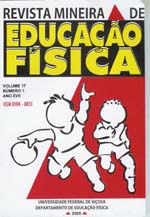TECHNICAL PROFILE AND COLLECTIVE EFFICACY OF SIX BASKETBALL TEAMS OF U-17 CATEGORY PARTICIPANTS OF THE METROPOLITAN CHAMPIONSHIP IN MINAS GERAIS STATE
Keywords:
basketball, game analysis, effectivenessAbstract
This study aimed to describe the technical profile and collective effectiveness of six male basketball teams of U-17 category who participated of the Metropolitan Championship of Minas Gerais state. 12 matches were filmed, making it a total of 238 analyses for each of the 15 game indicators evaluated. The individual technical profile was determined through playing time in which the athlete participated in the match, two-point shots, three-points and free throws converted, defensive rebounds, offensive rebounds, assists, blocks, steals, turnover, fouls committed, and points scored. It was also considered the three-point, two points field goals and free throws percentage. Collective effectiveness was determined by the Offensive Effectiveness Coefficient (OEC), both for winning teams and for losing teams. The reliability of the observations was established by calculating the percentage of intraobserver agreements. The game indicators and the OEC were analyzed through descriptive statistics (measures of central tendency and standard deviation). The t-test for independent samples was used in order to identify differences in OEC among the winning teams and losing teams. The critical value assumed was P d” 0.05. It can be stated that during the 12 matches analyzed, the player has averaged 6.3 ± 7.04 points and participated of the match, on average, 20.16 ± 10.84 minutes. The t test for independent samples revealed differences in OEC calculated for the winning teams and losing teams (t = -3.26, df = 22, p = 0.004).
Downloads
References
IBAÑEZ, S.; GARCIA, J.; FEU, S.; LORENZO, A.; SAMPAIO, J. Effects of consecutive basketball games on the game-related statistics that discriminate winner and losing teams. Journal of Sports Science and Medicine, v. 8, p. 458-462, 2009.
LORENZO, A.; GOMEZ, M.A.; ORTEGA, E.; IBAÑEZ, S.; SAMPAIO, J. Game related statistics which discriminate between winning and losing under-16 male basketball games. Journal of Sports Science and Medicine, v. 9, p. 664-668, 2010.
ORTEGA, E.; GOMEZ, M.A.; SAMPAIO, J.; IBAÑEZ, S.; LORENZO, A.; MARTÍNEZ, J . Análisis lanzamiento de 3 puntos en baloncesto de formación. Revista Portuguesa de Ciências do Desporto, v. 7, Supl. 1, p. 35, 2007.
SAMPAIO, J.; JANEIRA, M. Uma caminhada metodológica na rota das estatísticas e da análise do jogo de basquetebol. Lecturas Educación Física y Deportes. Revista Digital, n. 39, ano 7, agosto de 2001. Disponível em: <http://www.efdeportes.com>. Acesso em: 14 abril 2013.
TURCOLIVER, D. Established Methods. Journal of Basketball Studies, 1990. Disponível em: <http://www.tsoft.com/~deano/>
TURCOLIVER, D. New measurements techniques and a binomial model of the game of basketball. Journal of Basketball Studies, 1991. Disponível em: < http://www.tsoft.com/~deano/>.
VAN DER MARS, H. Observer reliability: issues and procedures. In: DARST, P. W.; ZAKROSJSEK, D. B.; MANCINI, V. H. (Org.). Analysing physical education and sports instruction. Champaign: Human Kinetics, 1989. p. 53-80.
Downloads
Published
How to Cite
Issue
Section
License
Os artigos submetidos e publicados são de inteira responsabilidade de seus autores, não refletindo necessariamente a opinião do Comitê Editorial. A revista se reserva o direito de efetuar, nos originais, alterações de ordem normativa, ortográfica e gramatical, com vistas a manter o padrão culto da língua, respeitando, porém, o estilo dos autores. O manuscrito submetido deve ser original, não podendo ter sido publicado em qualquer outro veículo de informação científica, e nem submetido para publicação em outra revista científica. Os trabalhos publicados passam a ser propriedade da revista Mineira de Educação Física, ficando sua reimpressão total ou parcial de acordo com a licença Creative Commons Attibution 4.0. Deve ser consignada a fonte de publicação original. Os originais não serão devolvidos aos autores. As opiniões emitidas pelos autores dos artigos são de sua exclusiva responsabilidade.





 Esta obra está licenciada com uma Licença
Esta obra está licenciada com uma Licença 